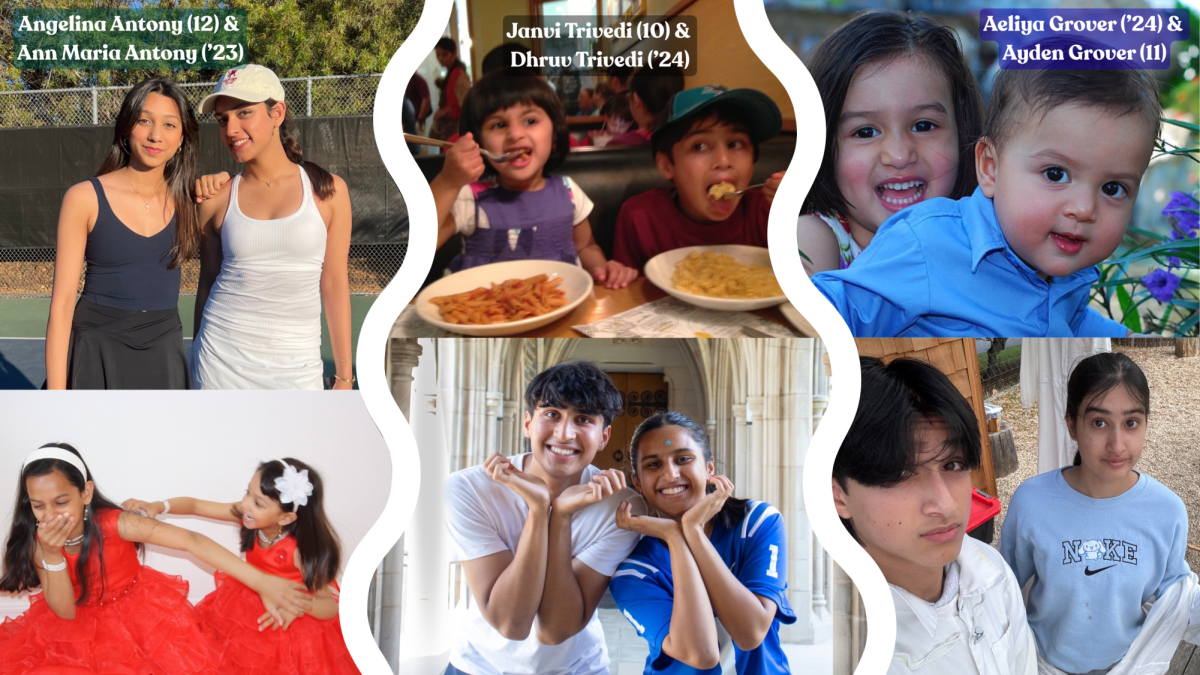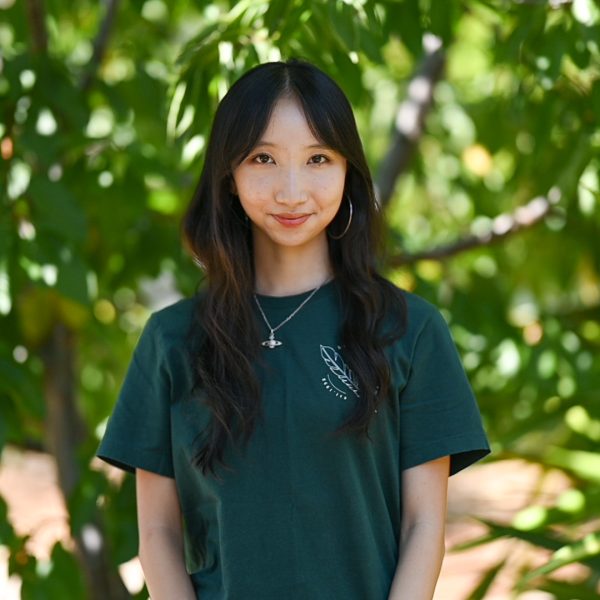Siblings can be both companions and rivals, but every younger sibling at Harker must eventually face the same moment: watching an older sibling leave for college. No matter the relationship, nothing truly prepares them for how the departure transforms everyday routines overnight.
Senior Angelina Antony felt that shift during her frosh year, when her older sister, Annmaria Antony (’23), graduated. The absence of the person she called her closest confidant left her uncertain how daily life would change without that constant presence.
“Before she left, we had been at the same campus for eight years, so it was a very big change,” Angelina said. “I didn’t really know what to expect because she was always my best friend and the person I would go to about anything.”
The most immediate change is the sudden quiet, with no sibling to turn to for asking quick advice or sharing random updates. That absence hit sophomore Janvi Trivedi when her brother, Dhruv Trivedi (’24), departed for college, leaving the house feeling a little emptier.
“It felt a little different at home, being a family of three instead of a family of four,” Janvi said. “It’s hard not being able to just talk to him and ask him questions whenever I want and having to wait until a specific time to call him.”
The change can also show itself in small, everyday moments. Junior Ayden Grover found that the absence of his sister, Aeliya Grover (’24), impacted both his schoolwork and downtime.
“There’s a lot more solitude,” Ayden said. “We used to do work in the same room. Now, it’s both a benefit and a negative. When I’m doing work, I don’t have to deal with her in the room, but also, if I’m doomscrolling, then she doesn’t remind me to stop scrolling and focus. I’ve become more self-dependent.”
Beyond the new quiet at home, distance also changes how siblings connect. Angelina noticed that long-distance communication created gaps that texting couldn’t always fill.
“Going home, I would always have her there, I would always tell her what happened at school, and she knew everything about my life,” Angelina said. “But obviously, it’s hard to have that same thing texting her, so she just knows less about me. More often, I would tell her something, and she’d be like, ‘Oh I didn’t even know you did that.’”
Still, students find ways to adapt. Angelina’s sister, who attends Stanford, makes an effort to spend time with her outside of school hours. In turn, she often surprises her sister at Stanford or visits the campus to study on the weekends, taking the opportunity to catch up with her sister in person.
For Ayden, whose sister attends college further away at the University of Chicago, the adjustment came gradually. Although the change was initially jarring, with time he found new rhythms and comfort in unexpected places.
“I got closer with my pets, and now I don’t really miss her that much,” Ayden said. “Once I got into my rhythm, I was able to find a good pace with all the activities I was doing. We will still check in every once in a while.”
Similarly, Janvi developed her own way of staying close to her brother, texting him weekly with check-ins on each other’s lives. Looking back on her experience, she offers advice for younger siblings stepping into that same loneliness for the first time.
“It’s OK to be sad,” Janvi said. “But also, you should know that they’re probably going to be back more often than you know it, and it won’t really feel that different.”


















![“[Building nerf blasters] became this outlet of creativity for me that hasn't been matched by anything else. The process [of] making a build complete to your desire is such a painstakingly difficult process, but I've had to learn from [the skills needed from] soldering to proper painting. There's so many different options for everything, if you think about it, it exists. The best part is [that] if it doesn't exist, you can build it yourself," Ishaan Parate said.](https://harkeraquila.com/wp-content/uploads/2022/08/DSC_8149-900x604.jpg)




![“When I came into high school, I was ready to be a follower. But DECA was a game changer for me. It helped me overcome my fear of public speaking, and it's played such a major role in who I've become today. To be able to successfully lead a chapter of 150 students, an officer team and be one of the upperclassmen I once really admired is something I'm [really] proud of,” Anvitha Tummala ('21) said.](https://harkeraquila.com/wp-content/uploads/2021/07/Screen-Shot-2021-07-25-at-9.50.05-AM-900x594.png)







![“I think getting up in the morning and having a sense of purpose [is exciting]. I think without a certain amount of drive, life is kind of obsolete and mundane, and I think having that every single day is what makes each day unique and kind of makes life exciting,” Neymika Jain (12) said.](https://harkeraquila.com/wp-content/uploads/2017/06/Screen-Shot-2017-06-03-at-4.54.16-PM.png)








![“My slogan is ‘slow feet, don’t eat, and I’m hungry.’ You need to run fast to get where you are–you aren't going to get those championships if you aren't fast,” Angel Cervantes (12) said. “I want to do well in school on my tests and in track and win championships for my team. I live by that, [and] I can do that anywhere: in the classroom or on the field.”](https://harkeraquila.com/wp-content/uploads/2018/06/DSC5146-900x601.jpg)
![“[Volleyball has] taught me how to fall correctly, and another thing it taught is that you don’t have to be the best at something to be good at it. If you just hit the ball in a smart way, then it still scores points and you’re good at it. You could be a background player and still make a much bigger impact on the team than you would think,” Anya Gert (’20) said.](https://harkeraquila.com/wp-content/uploads/2020/06/AnnaGert_JinTuan_HoHPhotoEdited-600x900.jpeg)

![“I'm not nearly there yet, but [my confidence has] definitely been getting better since I was pretty shy and timid coming into Harker my freshman year. I know that there's a lot of people that are really confident in what they do, and I really admire them. Everyone's so driven and that has really pushed me to kind of try to find my own place in high school and be more confident,” Alyssa Huang (’20) said.](https://harkeraquila.com/wp-content/uploads/2020/06/AlyssaHuang_EmilyChen_HoHPhoto-900x749.jpeg)





